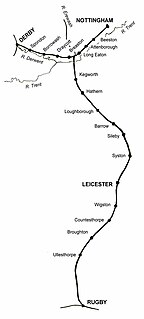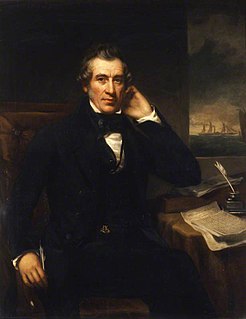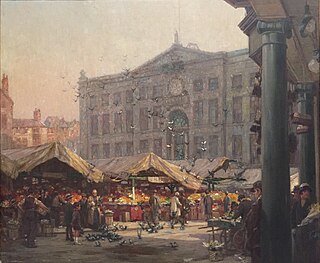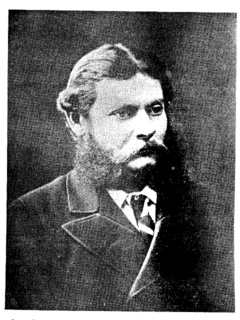


Richard Allen (1814 - 16 February 1884) was a stationer and publisher in Nottingham.



Richard Allen (1814 - 16 February 1884) was a stationer and publisher in Nottingham.
He was born on 29 December 1814, the son of Edward Allen (1788-1863) of Leicester and Sarah Townsend (1792-1941).
He married firstly Catherine Morris (1816 - 2 October 1837) and they had one child.
He married secondly Mary Ann Small (1810 - 1900), eldest daughter of William Small, on 12 July 1838 at Skirbeck and they had two children:
He took an active part in the establishment of the Park Company of the Robin Hood Rifles. He was also Provincial Grand Secretary of the Nottingham Freemasons.
He died on 16 February 1884 at his house Albert Villa, 21 Cavendish Crescent South, The Park, Nottingham [1] and left an estate valued at £34,611 9s 1d. (equivalent to £3,634,400in 2019). [2]
He succeeded to the business of Samuel Bennett in 1836, printer and publisher, based on Long Row in Nottingham and until 1847 [3] issued the Nottingham and Newark Mercury, later shortened to the Nottingham Mercury , which was the organ of the Whig party in Nottingham. [4]
He was based at Caxton House Photographic Studio, 34 Long Row, Nottingham and produced many Carte de visite for local people.
In June 1860 he installed a steam engine and Cameron’s patent boiler to power the printing presses and insured it with the Steam Boiler Assurance Company of Manchester On 10 December, the insurance company sent its inspector who discovered considerable leakage and corrosion but deemed the boiler safe to continue to use until Christmas when repairs could be made. On 14 December the boiler exploded but the insurance company refused to pay out which led to a Nisi prius court case in 1864 from which Richard Allen was awarded £58 (equivalent to £5,700in 2019) [2] in damages. [5]
Later in life he converted his stationery and book-binding business into a limited liability company and he retired from the active management of it, but remained a director up until his death. [6]

The Midland Railway (MR) was a railway company in the United Kingdom from 1844. The Midland was one of the largest railway companies in Britain in the early 20th century, and the largest employer in Derby, where it had its headquarters. It amalgamated with several other railways to create the London, Midland and Scottish Railway at grouping in 1922.

The Midland Counties' Railway (MCR) was a railway company in the United Kingdom which existed between 1839 and 1844, connecting Nottingham, Leicester and Derby with Rugby and thence, via the London and Birmingham Railway, to London. The MCR system connected with the North Midland Railway and the Birmingham and Derby Junction Railway in Derby at what become known as the Tri Junct Station. The three later merged to become the Midland Railway.
Richard Mountford Deeley was an English engineer, chiefly noted for his five years as Chief Mechanical Engineer (CME) of the Midland Railway. Richard Deeley is recorded as being born in Derby His father had been an accountant with the Midland Railway and Richard attended grammar school in Chester.

Sir William Fairbairn, 1st Baronet of Ardwick was a Scottish civil engineer, structural engineer and shipbuilder. In 1854 he succeeded George Stephenson and Robert Stephenson to become the third president of the Institution of Mechanical Engineers.
Beyer, Peacock and Company was an English railway locomotive manufacturer with a factory in Openshaw, Manchester. Founded by Charles Beyer, Richard Peacock and Henry Robertson, it traded from 1854 until 1966. The company exported locomotives, and machine tools to service them, throughout the world.

The North Midland Railway was a British railway company, which opened its line from Derby to Rotherham (Masbrough) and Leeds in 1840.

Colwick is a village, civil parish, and suburb of the city of Nottingham, in the English ceremonial county of Nottinghamshire. It is situated to the east of Nottingham's city boundary, and forms the Colwick ward within the local government district of Gedling. At the time of the 2011 census, the village had a population of 2,829.

The Midland Railway 115 Class is a class of 4-2-2 steam locomotive, nicknamed "Spinners". They were designed by Samuel Waite Johnson and a total of 15 of the class were built between 1896 and 1899. They were capable of reaching speeds of up to 90 miles per hour.

Lowdham railway station is a Grade II listed railway station which serves the village of Lowdham in Nottinghamshire, England.

Burton Joyce railway station serves the village of Burton Joyce in Nottinghamshire, England. It lies between Carlton and Lowdham stations on the Nottingham to Lincoln Line.

Whitwell railway station serves the village of Whitwell in Derbyshire, England. The station is on the Robin Hood Line 4¾ miles (7 km) south west of Worksop towards Nottingham.

The York and North Midland Railway (Y&NMR) was an English railway company that opened in 1839 connecting York with the Leeds and Selby Railway, and in 1840 extended this line to meet the North Midland Railway at Normanton near Leeds. Its first chairman was the railway financier George Hudson, who had been called the railway king.

Colwick Hall was an English country house in Colwick, Nottinghamshire. It is now a hotel. The building is Grade II* listed.

Bradshaw's was a series of railway timetables and travel guide books published by W.J. Adams and later Henry Blacklock, both of London. They are named after founder George Bradshaw, who produced his first timetable in October 1839. Although Bradshaw died in 1853, the range of titles bearing his name continued to expand for the remainder of the 19th and early part of the 20th century, covering at various times Continental Europe, India, Australia and New Zealand, as well as parts of the Middle-East. They survived until May 1961, when the final monthly edition of the British guide was produced. The British and Continental guides were referred to extensively by presenter Michael Portillo in the BBC TV series Great British Railway Journeys, Great Continental Railway Journeys, Great American Railroad Journeys, Great Indian Railway Journeys, Great Alaskan Railroad Journeys, Great Canadian Railway Journeys, Great Australian Railway Journeys and Great Asian Railway Journeys.
Edwalton railway station served the village and district of Edwalton in the English county of Nottinghamshire. It was opened on the Midland Railway Manton direct route between London and Nottingham, avoiding Leicester.

Nottingham Exchange was built in the Market Place in Nottingham between 1724 and 1726 as the main offices of the Nottingham Corporation.

Dewrance & Co. Ltd was a manufacturer of engine and boiler accessories, such as pumps and gauges.

George Chaworth Musters (1841–1879) was a British Royal Navy commander and traveller, known as the "King of Patagonia".